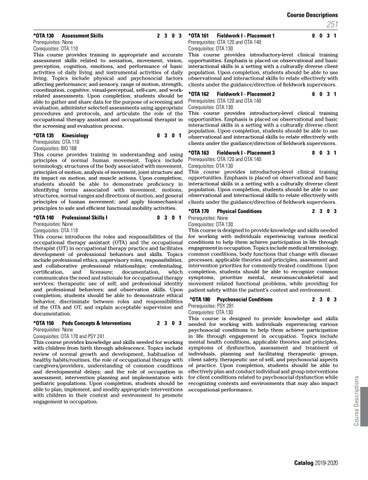Course Descriptions
251 2 3 0 3
This course provides training in appropriate and accurate assessment skills related to sensation, movement, vision, perception, cognition, emotions, and performance of basic activities of daily living and instrumental activities of daily living. Topics include physical and psychosocial factors affecting performance; and sensory, range of motion, strength, coordination, cognitive, visual-perceptual, self-care, and workrelated assessments. Upon completion, students should be able to gather and share data for the purpose of screening and evaluation, administer selected assessments using appropriate procedures and protocols, and articulate the role of the occupational therapy assistant and occupational therapist in the screening and evaluation process.
*OTA 135 Kinesiology Prerequisites: OTA 110 Corequisites: BIO 168
0 3 0 1
This course provides training in understanding and using principles of normal human movement. Topics include terminology, structures of the body associated with movement, principles of motion, analysis of movement, joint structure and its impact on motion, and muscle actions. Upon completion, students should be able to demonstrate proficiency in identifying terms associated with movement, motions, structures, normal ranges and directions of motion, and general principles of human movement; and apply biomechanical principles to safe and efficient functional mobility activities.
*OTA 140 Professional Skills I Prerequisites: None Corequisites: OTA 110
0 3 0 1
This course introduces the roles and responsibilities of the occupational therapy assistant (OTA) and the occupational therapist (OT) in occupational therapy practice and facilitates development of professional behaviors and skills. Topics include professional ethics, supervisory roles, responsibilities, and collaborative professional relationships; credentialing, certification, and licensure; documentation, which communicates the need and rationale for occupational therapy services; therapeutic use of self; and professional identity and professional behaviors; and observation skills. Upon completion, students should be able to demonstrate ethical behavior, discriminate between roles and responsibilities of the OTA and OT, and explain acceptable supervision and documentation.
*OTA 150 Peds Concepts & Interventions Prerequisites: None Corequisites: OTA 170 and PSY 241
2 3 0 3
This course provides knowledge and skills needed for working with children from birth through adolescence. Topics include review of normal growth and development, habituation of healthy habits/routines, the role of occupational therapy with caregivers/providers, understanding of common conditions and developmental delays; and the role of occupation in assessment, intervention planning and implementation with pediatric populations. Upon completion, students should be able to plan, implement, and modify appropriate interventions with children in their context and environment to promote engagement in occupation.
*OTA 161 Fieldwork I - Placement 1 Prerequisites: OTA 120 and OTA 140 Corequisites: OTA 130
0 0 3 1
*OTA 162 Fieldwork I - Placement 2 Prerequisites: OTA 120 and OTA 140 Corequisites: OTA 130
0 0 3 1
*OTA 163 Fieldwork I - Placement 3 Prerequisites: OTA 120 and OTA 140 Corequisites: OTA 130
0 0 3 1
*OTA 170 Physical Conditions Prerequisites: None Corequisites: OTA 130
2 3 0 3
*OTA 180 Psychosocial Conditions Prerequisites: PSY 281 Corequisites: OTA 130
2 3 0 3
This course provides introductory-level clinical training opportunities. Emphasis is placed on observational and basic interactional skills in a setting with a culturally diverse client population. Upon completion, students should be able to use observational and interactional skills to relate effectively with clients under the guidance/direction of fieldwork supervisors.
This course provides introductory-level clinical training opportunities. Emphasis is placed on observational and basic interactional skills in a setting with a culturally diverse client population. Upon completion, students should be able to use observational and interactional skills to relate effectively with clients under the guidance/direction of fieldwork supervisors.
This course provides introductory-level clinical training opportunities. Emphasis is placed on observational and basic interactional skills in a setting with a culturally diverse client population. Upon completion, students should be able to use observational and interactional skills to relate effectively with clients under the guidance/direction of fieldwork supervisors.
This course is designed to provide knowledge and skills needed for working with individuals experiencing various medical conditions to help them achieve participation in life through engagement in occupation. Topics include medical terminology, common conditions, body functions that change with disease processes, applicable theories and principles, assessment and intervention priorities for commonly treated conditions. Upon completion, students should be able to recognize common symptoms, prioritize mental, neuromusculoskeletal and movement related functional problems, while providing for patient safety within the patient’s context and environment.
This course is designed to provide knowledge and skills needed for working with individuals experiencing various psychosocial conditions to help them achieve participation in life through engagement in occupation. Topics include mental health conditions, applicable theories and principles, symptoms of dysfunction, assessment and treatment of individuals, planning and facilitating therapeutic groups, client safety, therapeutic use of self, and psychosocial aspects of practice. Upon completion, students should be able to effectively plan and conduct individual and group interventions for client conditions related to psychosocial dysfunction while recognizing contexts and environments that may also impact occupational performance.
Catalog 2019-2020
Course Descriptions
*OTA 130 Assessment Skills Prerequisites: None Corequisites: OTA 110
